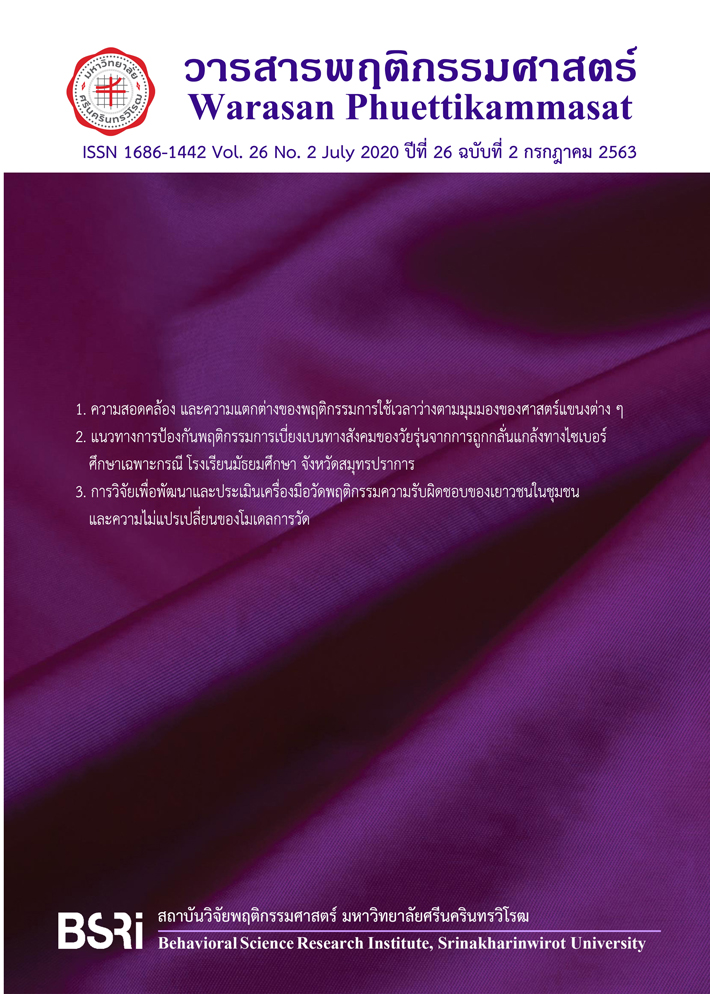Consistency and differences in leisure behavior according to the perspective of various sciences
Keywords:
Leisure, Sociology, Anthropology, EducationAbstract
In the study of behavioral science found that there are 3 major sciences related to leisure: sociology, anthropology and education. In which each perspective of science has consistency and differences. The meaning of leisure according to the perspective of each science consists of 2 parts. Include the meaning that is the core of the word leisure and the meaning according to the interest from the perspective of that science. This study is a concept gathering from the article, various researches have been summarized to create 3 benefits: 1) Being able to understand the context of leisure according to each science. 2) Can be used as a guideline in determining the definition operating definition of the word leisure in accordance with the context of that science. 3) Able to summarize the meaning in behavioral science. From the study found that leisure in the sociological perspective focusing on social activities which results from social mechanisms. As for the aspect of anthropology perspective focusing on to doing activities that are entertainment, relaxation, have fun according to their own needs. And the educational perspective will focus on the youth in school age is the use of time other than study time for making good bring benefits and self-development in various fields to be relevant to the needs of the curriculum. Therefore, the leisure in behavioral science will have a meaning that covers all 3 science, with both forms and activities with others or doing individual activities which may be in line with society's expectations or just for relaxation or for self-development.
Downloads
References
communities. Dublin: Children’s Research Centre, Trinity College. Dublin & Combat
Poverty Agency.
Chaloemphuthiphong, S. (2013). khwāmtō̜ngkānkitkamkānchaiwēlāwānglækhunnaphāpchīwit
khō̜ngphūsūngʻāyunaichomromphūsūngʻāyukrungthēpmahānakhō̜n. [Activity needs,
leisure time and quality of life of Elderly in the Bangkok Elderly Club]. Bangkok:
Kasetsart University.
Chick, Garry. (2009). Leisure and culture. Leisure Sciences An Interdisciplinary Journal.
Volume 20, : Issues for an anthropology of leisure.
Chua, Steven. (2001). The Sociology of Leisure: An Examination of the Relationship Between
Perceived Experience and Leisure Participation. Doctoral thesis, University of Surrey.
Chuangmaneechote, T. (2011). Withīchīwitkānchaiwēlāwāngkhō̜ngbuklākō̜nnaimahāwitthayālai
kasētsāt. [Way of life and leisure time usage of personnel at Kasetsart University].
Bangkok: Kasetsart University.
Crawford, Duane. W. &Godbey, Geoffrey. (1987). A hierarchical model of leisure constraints.Published online: 13 Jul 2009. Download citation. https://doi.org/10.1080/
01490409109513147
Deci, E. L., & Ryan, R. M. (2000). The “what” and “why” of goal pursuits: Human needs and the self-determination of behavior. Psychological Inquiry, 11, 227-268.
Fawcett, Lillian M. (2007). School's Out: Adolescent Leisure Time Activities, Inuences and Consequences. Faculty of Computing, Health and Science, Edith Cowan University. Australia.
Freysinger, V.J. (1995). The dialectics of leisure and development for women and men in midlife: An interpretive study. Journal of Leisure Research, 27, 61-84.
Henderson. (2017). Leisure and Active Lifestyles: Research Reflections Leisure Sciences.
Leisure Sciences website.
Hong, S. M. & Giannakopoulos E, (1994). The relationship of satisfaction with life to personality characteristics. Journal of J Psychol. 1994. Sep;128(5):547-58.
Hutchinson, Susan L. (2012). Leisure as a Resource for Successful Aging by Older Adults with Chronic Health Conditions. The International Journal of Aging and Human Development First Published April 11, 2012.
Inchan, D. (2018). Mānusayawitthayā Phatthanā-kān. [Developmental anthropology – Interim].
Bangkok: Sirindhorn Anthropology Center.
Jinesh, Soumya . (2018). The prediction that people living in 21st century will have more free
time because of the improvements in technology has come true. Copyright © 2005-2019 TestPrep Communities by testbig.com, All rights reserved.
Kelly, R John. (2012). Leisure. Sagamore Pub. Llc; 4th Revised edition. USA.
Kelly, J. & Freysinger, V. (2000) 21st century leisure: Current issues. Allyn & Bacon, Boston.
Ken, Roberts. (2013). Sociology of leisure. University of Liverpool, UK.
Kraus, R. (2001), Recreation and Leisure in Modern Society. 6th edn, Jones & Bartlett, Sudbury, MA.
Lidija, Vujačić . (2018). Národopisná revue (Journal of Ethnology) 2018.
Anthropology of everyday life and a phenomenon of leisure. P.87 – 93.
Mannell, Roger C. & Kleiber, Douglas A. (1997). A Social Psychology of Leisure. Venture Publishing. Inc.
Mlinarevic, V. (2006). Leisure time as a predicator of students' behaviour disorder, Phd
disertation, Zagreb, Sveuciliste u Zagrebu.
Omerdic, Nusreta. (2015). Leisure time of primary school students as an important factor of
education and personal development. Educational Faculty; University in Travnik.
Bosnia and Herzegovina.
Pesavento, C. & Ashton, Candace. (2011). Leisure Education In the Schools. A Position Paper
of the American Association for Physical Activity and Recreation (AAPAR). California
AAHPERD Convention March 29 – April 2, 2011.
Phatphongphan, K. (2010). Patčhaithīsongphontō̜ kānchaiwēlāthī mo̜somkhō̜ngnakrīan
chūangchanthīSāmRōngrīansāthitMahāwitthayālairāmkhamhǣng.[ Factors affecting
the appropriate use of time for students in the 3rd level of the Demonstration School
Ramkhamhaeng University]. Bangkok: Kasetsart University.
Previsic, V. (2000). Leisure time between pedagogical theory and educational practice,
Napredak 141 (4)
Russell,R. (2013). Pastimes: The context of contemporary Leisure (5th ed.). Dubuque, IA:
Brown & Benchmark.
Samdahl, Diane M. & Jekubovich, Nancy. J. (1993). A Critique of Leisure Constraints:
Comparative Analyses and Understandings. Journal of Leisure Research 1997,
Vol. 29, No. 4, pp. 430-452.
Sukkul, B. (2009). Kānchaiwēlāwāngkhō̜ngwairuntō̜ntonthīmīphrưttikamkāorāo. [The use of
leisure of early adolescents with aggressive behavior]. Bangkok: Kasetsart University.
Sungsomsakul, A. (2014). Rūpbǣpkānkhaorō̜wō̜makānchaiwēlāwāngkhō̜ngprachāchonnai
čhangwatnaiphāktawanʻō̜kchīangnư̄a. [Participation patterns, leisure usage of people in
provinces in the region North east]. Bangkok: Kasetsart University.
Tantimala, C. (2017). Kānsāngʻatlakkhō̜ngtalātnatphāinaimahāwitthayālaikhō̜ngratkhēt
Krungthēpmahānakhō̜n. [Establishing the identity of the flea market within the state
university Bangkok]. Bangkok: Srinakharinwirot University.
Thiamphet, P. (2005). Kānsưksākānchaiwēlāwāngkhō̜ngnakrīanchanmatthayomsưksātō̜nton
naisathānsưksākhanphư̄nthān Khēttrūatrātchakānthī Sām. [A study of leisure usage of
lower secondary school students in Basic school Government Inspection Area 3].
Bangkok: Srinakharinwirot University.
Thipboonsab, J. (2010). Kānprīapthīaplæwikhro̜khwāmsamphanrūpbǣpkānchaiwēlāwāng
khō̜ngnaksưksāwitthayālainānāchātmahāwitthayālaimahidon. [Comparison and
analysis of relationships between leisure patterns of international college
students Mahidol University] Bangkok : Silpakorn University.
Turner & Risjord. (2007). Philosophy of anthropology and sociology. Leisure
Sciences. Leisure. Sciences website.
Tylor Edward B. (1881).Anthropology an introduction to the study of man and civilization.
London: Macmillan and Co..
Downloads
Published
How to Cite
Issue
Section
License
Behavioral Science Research Institute, SWU
114 Sukhumvit 23, Bangkok 10110, Thailand.
Tel.02-649-5000 # 17600



